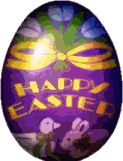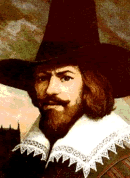Celebrations
![]()
Celebrations
Valentine's
Day - click
Carnival - click
Easter - this is a very old festival. It used to celebrate the start of Spring or "new life". Easter is always between March 22nd and April 25th. Easter Sunday is the most important festival in the church year -many people who don't go to church regulary, go on Easter Sunday. Children are given Easter eggs, made of chocolate and wrapped in coloured paper.

St. David's Day - March 1st -There is a story that for several years St. David ate only bread and leeks. That is why Welshmen sometimes wear leeks on St. David's Day. They can wear daffodils (the national flower of Wales) instead.
Saint Patrick's Day. click
April Fools' Day - April 1st is April Fools' Day. This is a very old tradition from the Middle Ages. At that time the servants were masters for one day of the year. They gave orders to their masters and their masters had to obey. Now April Fools' Day is different. It's a day for jokes and tricks. All tricks must finish at midday.
Another theory
is that April Fools' began when Charles IX, following the Gregorian Calendar,
decreed January 1, 1562 as the official New Year instead of the the end of March/April
1 Solstices. Individuals who continued to honor or forgot and celebrated April
1st were teased, ridiculed and played pranks upon.
This must have been too much fun, it spread from France to England and then
to the US. Now we have a day of havoc for us all to tread and enjoy. Now this
story, the dates are all in dispute, proving Time maybe the best trickster of
all.
Suggestion: Have an April Fools' Foolishly Formal Party. Everyone must come
dressed formal or foolish...or foolishly formal. Great fun.

St. George's Day - April 23rd -St. George is the patron saint of England. We don't know much about him -he was probably a Roman soldier- and patriotic Englishmen wear a red rose on this day. It is also the birthday of William Shakespeare.
May Day - May 1st is May Day. It is a very old festival. In the past, May Day celebrated the start of summer. Today it is a national holiday in Britain. In some towns people dance around a maypole on May Day.
Hallowe'en. October 31st. click
 Guy
Fawkes' Night is also
called Bonfire Night. Guy Fawkes lived hundreds of years ago. On November
5th 1606 he tried to blow up the Houses of Parliament with gunpowder
because he didn't like the government. He failed; he was caught and executed.
"Remember, remember, the fifth of November" is still said by young
children and there is still a tradition of lighting bonfires and fireworks on
November 5th and burning figures of Guy Fawkes. From early October, you can
see children standing outside railway stations or on corners with figures made
of socks and straw and dressed in old clothes. They say: "Penny for the
guy" and collect quite a lot of money, which they spend on fireworks.
Guy
Fawkes' Night is also
called Bonfire Night. Guy Fawkes lived hundreds of years ago. On November
5th 1606 he tried to blow up the Houses of Parliament with gunpowder
because he didn't like the government. He failed; he was caught and executed.
"Remember, remember, the fifth of November" is still said by young
children and there is still a tradition of lighting bonfires and fireworks on
November 5th and burning figures of Guy Fawkes. From early October, you can
see children standing outside railway stations or on corners with figures made
of socks and straw and dressed in old clothes. They say: "Penny for the
guy" and collect quite a lot of money, which they spend on fireworks.
For more information, go to http://www.guy-fawkes.com

St. Andrew's Day - November 30th - The Scottish celebrate this day: they drink Scotch whisky, dance Scottish dances and sing Scottish songs on their national day.
Christmas
Eve, Christmas Day
and New Year. December 24th,
25th and January 1st. click
bibliography:
Festivals by Julie Ashworth and John Clark
Holidays and Festivals by Patience Thom
Customs and Traditions in Britain by Stephen Rabley